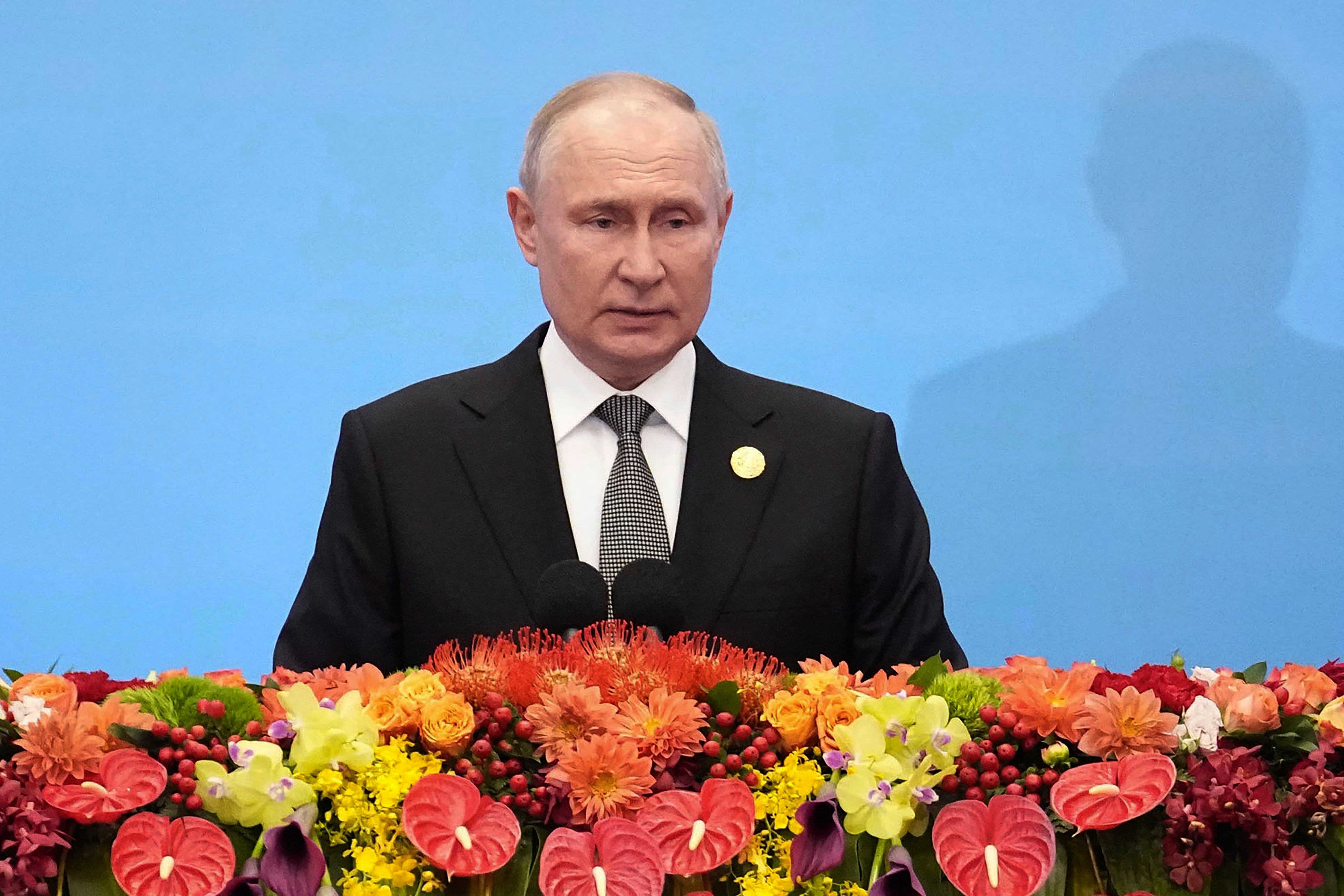Has the Israel-Gaza conflict just exposed Putin as the Tsar with no clothes?
From the recent war between Azerbaijan and Armenia to this conflict in Gaza, the Russian leader’s attempts to cosplay a serious global power player continue to look threadbare and unconvincing when actually put to the test, writes Dr Mark Galeotti

The inevitable concern is that Vladimir Putin will leverage the Israel-Gaza conflict to distract the West from Ukraine and weaken its commitment to supporting Kyiv. Yet while Moscow is certainly doing what it can to exploit this crisis, it is also highlighting the fundamental weakness of Russia’s position.
Putin certainly seems to be riding high. Feted as guest of honour at China’s Belt and Road Summit in Beijing, he scored a personal meeting with Xi Jinping. Even if European delegates walked out when he came to speak, he still got to talk cooperation with Viktor Orban of Hungary – prime minister of a Nato and EU member state. All of this seems to play to his claims that Russia is no declining post-imperial nation, but a serious global player offering an alternative to a hegemonic world order run by “Western globalist elites.”
Meanwhile, the West is now focused on Gaza, although majority feelings of outrage at the murderous terror tactics employed by Hamas clash with a vociferous but ardent minority arguing that Israel is harvesting the fruits of its occupation policies.
Despite inevitable claims that Moscow must have played some role in the Hamas attack, no evidence has emerged, and even Western intelligence services are downplaying the possibility. One British intelligence analyst sighed deeply when asked about this: “not everything is about the Russkies. This was very much made in Gaza… and Tehran.”
After some days of confusion, the Kremlin is doing what it can to use this as an opportunity for its usual tactics of division and diversion. Its disinformation outlets are doing what they can to fragment Western public opinion, pushing extreme narratives from both sides, while in the Global South, they are shamelessly peddling the notion that this is simply another expression of Western neo-colonialism.
This all sounds win-win for the Russians, especially if Israel gets sucked into a lengthy and bloody war in Gaza, which will not only distract Western opinion, but also divert resources. At a time of ammunition scarcity, every pallet of artillery shells heading to Israel is not bound for Ukraine.
Yet more thoughtful Russian analysts and even policymakers are not quite so sanguine. The crisis is also highlighting the degree to which Russia is at best a spoiler on the international stage. It benefited most when the Middle East was in constant but low-level chaos and mutual suspicion. It could cultivate Israel (especially thanks to Putin’s close relationship with Benjamin Netanyahu), keeping it from supplying weapons to Ukraine, yet also the Palestinians (including Hamas). It supported the Assad regime in Syria, while also cooperating with one of its main enemies, the Saudis. Iran was a regional rival, but also an ally in Syria and a fellow member of the “sanctioned by the Americans” club, happy to sell Russia weapons and provide sanctions-busting know-how.
To manage all these relationships was a complex feat that depended on Moscow being able to stay sat on not one, but many fences. This crisis is forcing a reluctant Russia to take sides. While Putin tried to combine conciliatory language towards both Israel and the Palestinians with a characteristic attempt to blame the Americans, this was not a line he could hold for long. He cannot afford to alienate Iran or Saudi Arabia, and so his relationship with Israel is deteriorating quickly.
Above all, what is clear is how little real muscle Putin has in such circumstances. He has no credible power projection options (America is sending one of its carrier battle groups – Russia’s only aircraft carrier is still being refurbished), no spare weapons to send, no real political leverage. Ultimately, he has no genuine allies, just a handful of clients such as Syria, and a collection of pragmatic partners only happy to work with him when it is in their interests. China’s Xi may hail his “strong personal friendship” with Putin, but it does not stop him from forcing the Russians to sell him oil and gas at a massive discount. Likewise, Iran is happy to sell drones and missiles, not just for money but also access to the most advanced Su-35 jets that Moscow had originally not wanted to sell.
As one US diplomat observed, “real power comes from being able to provide solutions – it’s becoming clear that all Putin can do is generate problems … I doubt, for example, that he’ll have a seat at the table if and when there is some serious attempt to resolve this crisis.”
From the recent war between Azerbaijan and Armenia to this conflict in Gaza, Putin’s attempts to cosplay a serious global power player continue to look threadbare and unconvincing when actually put to the test. Increasingly, he will find himself with few options but to align himself with the desperate, the unpopular and the pariah.
Dr Mark Galeotti is the author of ‘Putin’s Wars: from Chechnya to Ukraine’ (Bloomsbury, 2022)



Join our commenting forum
Join thought-provoking conversations, follow other Independent readers and see their replies
Comments